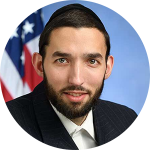Local elected officials remain uncertain about the prospect of another shutdown on their districts as the city and state considers further restrictions on their districts which are experiencing an uptick in COVID-19 cases to prevent the spread of the virus.
Positive test rates for COVID-19 have been rising steadily in multiple zip codes in Brooklyn and Queens with large Orthodox Jewish communities. Lawmakers with districts experiencing the uptick have been working hard to encourage mask-wearing and social distancing in an attempt to prevent the need for more restrictions but it hasn’t been enough. And as the case rate keeps increasing, so does the fear that the uptick will become a full-blown second wave of the virus prompting the city and state to take more drastic measures by closing schools and possibly nonessential businesses.
But, lawmakers in the districts experiencing the increase in COVID-19 cases are torn over whether broad closures within the zip codes are the right decision, especially since the new cases seem to be spreading predominantly within the tightly knit Orthodox Jewish communities that live in those zip codes.
“The city is approaching this issue with a shotgun when they need to be using a laser beam,” said State Senator James Sanders Jr. (D-Queens) early on Monday afternoon about a proposal made by the mayor on Sunday. “We need to address this issue where it is, instead of bringing the greater community into this. Focus on where the problem is coming from.”
Mayor Bill de Blasio’s proposal, which required approval by the governor, would close all schools and non-essential businesses in the nine zip codes where the testing rate for COVID-19 has been above 3% for seven days. According to his plan, the zip codes would be under the increased restrictions for at least 2 weeks starting Wednesday while the city works to suppress the virus.
On Monday Governor Andrew Cuomo agreed to shut down the schools and moved up the closing date by a day to Tuesday. But, he is still considering whether or not to shut down nonessential businesses in the problem zip codes, leaving the mayor and the governor yet again butting heads on how the city should be run.
The nine zip codes include the neighborhoods of Kew Gardens, Kew Gardens Hills, Pomonok, Edgemere and Far Rockaway in Queens and Borough Park, Gravesend, Homecrest, Midwood, Bensonhurst, Mapleton, Flatlands, Gerritson Beach, and Sheepshead Bay in Brooklyn.
Borough Park has the highest rate of positive cases in Brooklyn and Edgemere and Far Rockaway have the highest in Queens.
Multiple Queens and Brooklyn lawmakers whose districts have increasing rates of the coronavirus and would be affected by the closures did not respond to requests for comment or declined to comment for this story. This included lawmakers whose districts included the zip codes with the highest rates in their borough or even in the city.


Two Brooklyn lawmakers representing Borough Park – City Councilmember Kalman Yeger and Assemblymember Simcha Eichenstein – while not issuing statements to the press – were both highly critical of Brough Park and Hassidic neighborhoods being singled out for school and non-essential businesses closures on Twitter.
Neighborhood with highest 7-day COVID numbers in NYC? Gravesend (11223).
Chasidim living there? ZERO.
But you wouldn’t know it from what much of government & media are saying.
I wonder why.
(h/t @bern_hogan for the chart) pic.twitter.com/muTccvsdZZ— Kalman Yeger ונשמרתם מאד לנפשותיכם (@KalmanYeger) October 6, 2020
This is the most backwards plan one can conjure up. Driving shoppers to other neighborhoods will only widen the hotspots.
Forcing another shutdown on our small businesses, further bankrupting them as they teeter on the edge of survival, will be the final nail in their coffin. https://t.co/3kKeEJsMGh
— Simcha Eichenstein (@SEichenstein) October 6, 2020
Closing schools will impact both children and parents, Sanders said. Parents with no readily available childcare won’t be able to work which will have a domino effect on the community.
“Parents who have to stay home will not be able to hold jobs, loss of jobs means not being able to pay rent, no rent leads to evictions, evictions lead to foreclosures, no money means no patronizing of local businesses, so the few stores that have managed to stay open would be going down the drain,” he said.
State Senator Toby Stavisky (D-Central Queens) on the other hand, was supportive of closing schools. She said that it was, without a doubt, the right decision.
“Certainly you don’t want to put the students, or the teachers or the staff at risk,” she said.
But she was less enthusiastic about the prospect of closing nonessential businesses.
“They’re already struggling. Some of them just opened up and now they’ve got to pull the shades and lock the doors again,” she said.
She understands that it might be necessary to close them temporarily, she said, but that doesn’t make it easy. She just hopes that if they have to close, it will only be for a short period of time, she said.
Stavisky hopes that the current uptick is an anomaly caused by the Jewish holidays that take place one after another this time of year, she said.
“I don’t know. I hope that’s all it is,” she said.
People need to socially distance and wear masks if they decide to gather to celebrate the holidays, she said. She, for example, attended services held by her synagogue for the high holy days via Zoom.
And while she may be uncertain about closing down businesses, Stavisky is sure about one thing: if people had been following the restrictions and guidelines properly, the city might not be on the verge of another surge in the virus.
“People should be wearing masks and they should be social distancing. Perhaps this might not have been necessary,” she said. “Really I fault the people who walk around without masks.”
-Stephen Witt contributed to this story which first appeared in KCP sister site, Queens County Politics






